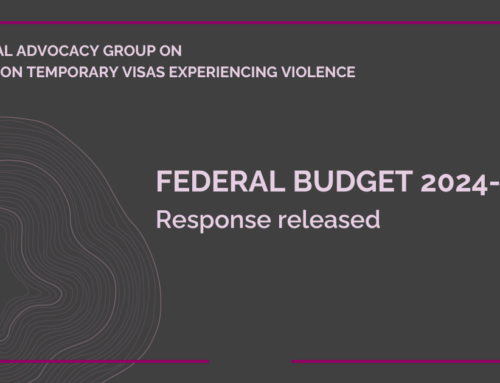Violence prevention advocates, sexual and reproductive health advocates and legal experts have today released a paper that underlines the importance of safe access zones as a key violence prevention measure in Australia.
Safe access zones are allocated ‘bubbles’ of safety around facilities that provide abortion care that prohibit harassment and intimidation of patients and staff. Safe access zones are in place in all States and Territories apart from South Australia and Western Australia.
The paper highlights that picketers outside of abortion care facilities can erode community trust and feelings of safety for staff working at these facilities and patients accessing services. With a majority of patients accessing these facilities being women, ensuring patients feel safe to access abortion services is key to primary prevention of violence against women.
The University of Queensland’s Pro Bono Centre, the Australian Women Against Violence Alliance and Marie Stopes Australia have developed the paper to inform legislative debate in South Australia and Western Australia, with both States in the process of, or committed to progressing safe access zone legislation.
The paper highlights key issues in debates surrounding safe access zones, specifically, implied freedom of political communication and whether safe access zones breach this constitutional right. This was a matter considered by the High Court recently with all seven judges agreeing that safe access zones do not breach the constitutional right of implied freedom of political communication.
The paper also considers and provides recommendations on key aspects of safe access zone legislation in South Australia and Western Australia including size, definitions of prohibited behaviour, premises that are covered by the zones and exemptions.
In the next two years Australia is providing its human rights review as a part of the Universal Periodic Review as well as its report on women’s rights under the Convention on the Elimination of All Forms of Discrimination Against Women (CEDAW). This paper provides a key argument for the harmonization of Australia’s safe access zone laws to prevent violence against women and pregnant people accessing vital sexual and reproductive health services.
QUOTES FROM Professor Heather Douglas, Law School, the University of Queensland:
‘Safe access to health care should be available to everyone and safe access to abortion care should be no different to other health care.’
‘Experience shows that legislation providing for safe access zones improves the safety and security for both health workers attending work and people seeking abortion care.’
QUOTES FROM THE AUSTRALIAN WOMEN AGAINST VIOLENCE ALLIANCE (AWAVA), Tina Dixson, Acting Program Manager:
“Access to reproductive healthcare is crucial for women and people who are pregnant in upholding their reproductive rights and bodily autonomy”.
“In situations of violence, access to sexual and reproductive healthcare is about long term recovery and living lives free from violence. For women currently experiencing violence, clinics need to be safe, calm and accessible environments free from judgement and harassment”.
QUOTES FROM MARIE STOPES AUSTRALIA, Jamal Hakim, Managing Director:
“Everyone has the right to access healthcare services safely and with their privacy and dignity protected and respected. Everyone has a right to access their workplace without being intimidated and harassed.”
“Sadly, the picketers outside our clinic in Western Australia believe they can harass and intimidate people without consequences, and this is unacceptable.”
“It really is sad that we need safe access zones. However, the experience of our staff and clients has shown how necessary they are. In places where they have been enacted, they have made a huge, positive impact on the feelings of safety and privacy for staff and clients.”
– Ends –
Marie Stopes Australia is a national not for profit provider of sexual and reproductive health services including permanent and long-acting reversible contraception and abortion care. For more information on our clinic network visit mariestopes.org.au
Media contact:
Jacquie O’Brien, Director Public Affairs and Policy, Marie Stopes Australia, 0428 396 391
Tina Dixson, Acting Program Manager, Australian Women Against Violence Alliance, 0428 541 396

